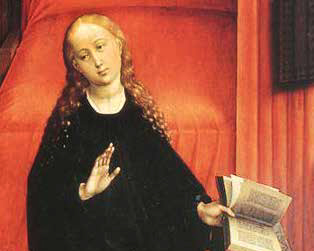The journey of the Word begins among the rolling hills of Galilee, in the small and unremarkable village of Nazareth. How strange that the Old Testament never speaks about Nazareth, or at least that is how it seems at first glance. But if we take a closer look at the word “Nazareth,” we realize that its literal meaning is linked to many biblical texts. In fact, it derives from the Hebrew word nāṣar, which means to preserve, to guard, to keep watch.
Two Old Testament texts can help us discover the link between Mary and Nazareth. The first is from the Book of Exodus (34:7), in which the verb nāṣar is a direct reference to God, who says he continues his kindness for a thousand generations. The second is from the Book of Proverbs (27:8), in which nāṣar refers to the Torah itself: “Those who keep the law (Torah) are wise children.” From nāṣar also derives the noun nēṣer which, in the realm of semantics, evokes agricultural images of new life: to bud, to sprout new shoots…. The prophet Isaiah announces that “a shoot shall sprout from the stump of Jesse, and from his roots a bud shall blossom. The spirit of the Lord shall rest upon him: a spirit of wisdom and of understanding, a spirit of counsel and of strength, a spirit of knowledge and of fear of the Lord” (Is. 11:1-2).
“Can anything good come out of Nazareth?” (Jn. 1:46) From Nazareth buds Mary: the star of the Torah, the sentinel of God, the lover of wisdom and the daughter of mercy. She was a person so capable of listening that she became the “place” in which heaven met earth, eternity embraced time, and God found a home. Formed in the school of the Scriptures and immersed in the story of her people, Mary of Nazareth listened to the voices of the prophets and the counsels of the wise and preserved them in her heart. In her we see the person who gave God the chance to speak to us and share himself with us. God reveals himself as the living Word and Mary emerges as the human being who welcomed that Word. As we would say today, Mary is the most genuine icon of lectio divina. But it is an icon that turns things upside down because it is not we who go to Mary but she who brings her message to us. Consequently the evangelist Luke leads us through the maze of streets and houses of Nazareth and enables us to quietly listen to that marvelous dialogue between the angel Gabriel and Mary (cf. Lk. 1:26-38). Sent by God, Gabriel has been assigned the task of helping this young girl discover her vocation. How? By “taking her by the hand,” so to speak, and accompanying her into the “garden of the Scriptures” so as to re-examine all the biblical texts that concern her. This is the same thing Jesus did with the two disciples he joined on the road to Emmaus. The messenger sent to Mary from heaven incites in her a memoria scripturarum, that is, “a recollection of the Scriptures.”
If we reread all the biblical texts cited by the angel Gabriel, we realize that he was urging her to recall the ancient messianic prophecies, which were well known to all devout Jews. The more Mary pondered the Scriptures, the more she was able to apply to her life not only their joyful messages, but also their more dramatic, forceful and challenging ones–messages that human beings might find alarming.
Mary of Nazareth imprints on history a great truth, namely that believers will discover their identities only through the Word. This sheds greater light on Psalm 40, which says: “In the scroll of the book it is written of me…” (v. 7). As it was for Mary, so too it is for every pilgrim of faith: profound immersion in Sacred Scripture broadens a person’s heart, enabling it to welcome into it all the words, actions and faces of humanity.
Prayer
Lord our God,
you made the Virgin Mary
the model of those who welcome your Word
and put it into practice.
Open our hearts to the beatitude of listening,
and through the power of your Spirit
help us too become a “holy place”
in which your saving Word
is brought to fulfillment today.
Through Christ our Lord. Amen.

